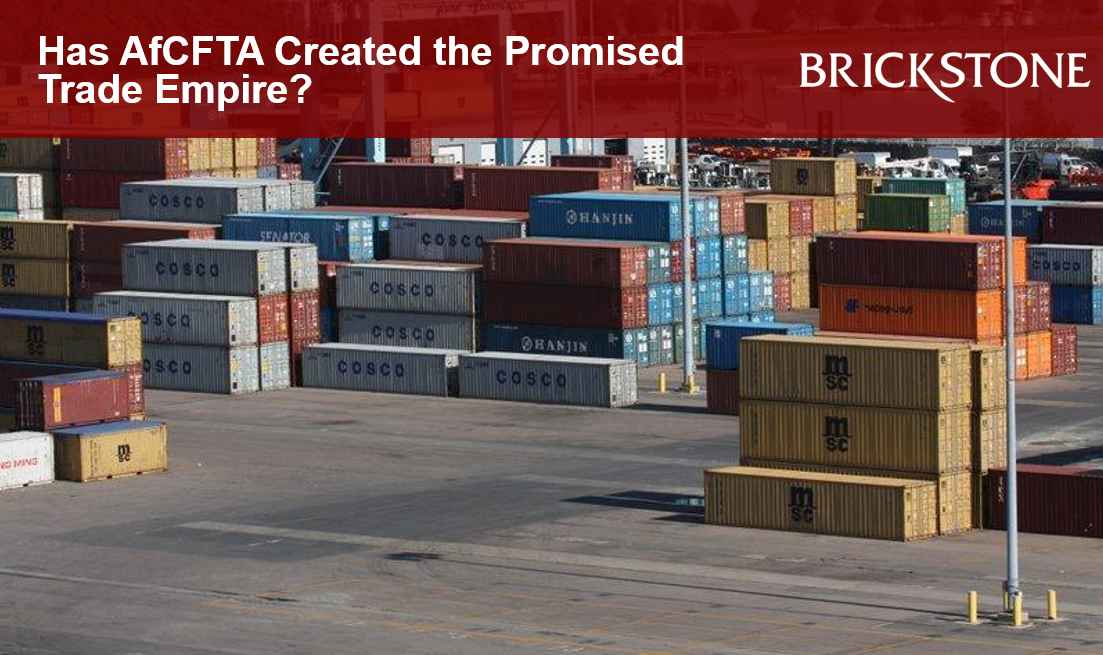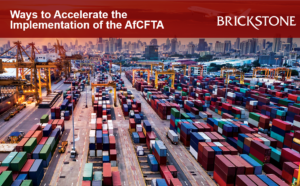Has AfCFTA created the Promised Trade Empire?
The AfCFTA, founded on the 21st of March, 2018, is one of the Flagship Projects of Agenda 2063 Africa’s development framework.
It is a free trade area encompassing most of Africa, aimed at boosting intra-African trade, and enabling African countries to proactively and swiftly respond to the twin green and digital transitions Africa faces in the 2020s. The flagship, if fully harnessed, houses enormous opportunities and potential such as positive economic outcomes, job creation, poverty reduction, and improvement of the quality of life of the people.
One year and some months since the Africa Continental Free Trade Agreement (AfCFTA) became operational in 2021, intra-African trade is neither free nor continental, as the flagship struggles to reach its promises.
This article by Brickstone reviews some institutional reports on why the implementation of AfCFTA is yet to create the promised trade empire.
The Africa Continental Free Trade Agreement (AfCFTA)
According to the World Bank, the AfCFTA represents a major opportunity for countries to boost growth, reduce poverty, and broaden economic inclusion. Implementing AfCFTA is expected to lift 30 million Africans out of extreme poverty and boost the incomes of nearly 68 million others who live on less than $5.50 a day; boost Africa’s income by $450 billion by 2035 (a gain of 7 percent) while adding $76 billion to the income of the rest of the world; increase Africa’s exports by $560 billion, mostly in manufacturing; spur larger wage gains for women (10.5 percent) than for men (9.9 percent); and boost wages for both skilled and unskilled workers—10.3 percent for unskilled workers, and 9.8 percent for skilled workers.
The African Continental Free Trade Area (AfCFTA) presents a major opportunity for African countries to bring 30 million people out of extreme poverty and to raise the incomes of 68 million others who live on less than $5.50 per day.
Despite carrying so much promise, the AfCFTA is yet to reach its goal and objectives as it faces certain challenges. According to Tech Cabal, AfCFTA faces the same problem; namely, Africa is not one entity by any measure. Accordingly, existing regional trade agreements are exclusive and differ wildly from trade agreements elsewhere on the continent. These regional agreements are themselves frequently ignored in favour of national protectionist policies like Kenya’s recent ban on Ugandan eggs, or petty political disagreements.
Where countries are relatively more open to cross-border trade, poor infrastructure and non-committal governments combine to frustrate the free flow of goods and services. Among other reasons why the AfCFTA is struggling, these 2 uncomfortable facts stand out. First, is the unresolved confusion of building a single continental market within which several dysfunctional regional markets already compete. And second, is the abysmal infrastructure that slows down the movement of any good that needs to be delivered across a border to a crawl.
But several companies are trying to make the best of the circumstances. Alongside older conglomerates like Bolloré Africa Logistics, newer players sporting shiny digital tools want to rebuild cross-border trade in Africa. While they have no influence over production and even less with trade policy, these firms are already deploying technology to manage freight, paperwork, and even offer vendor financing. But they can only go so far.
However, to maximize AfCFTA’s potential and realize its promises, African governments should conclude talks as planned and ensure the agreement covers investment and competition policy, intellectual property rights, and e-commerce. They are vested with the responsibility to ensure that policy, infrastructure, and adequate law enforcement are aligned throughout the continent.
There is no need for another conference, summit or, put plainly, photo op to smoothen the wrinkles with AfCFTA as it exists. Governments only need to do their job—and in the absence of camera lights.
According to the World Bank, African governments should also seek to build broad public support for AfCFTA and help businesses benefit from its provisions. Distributional impacts should be carefully monitored, and policies designed to provide social safety nets and programs for worker-retraining and job-switching.
Read more here.






